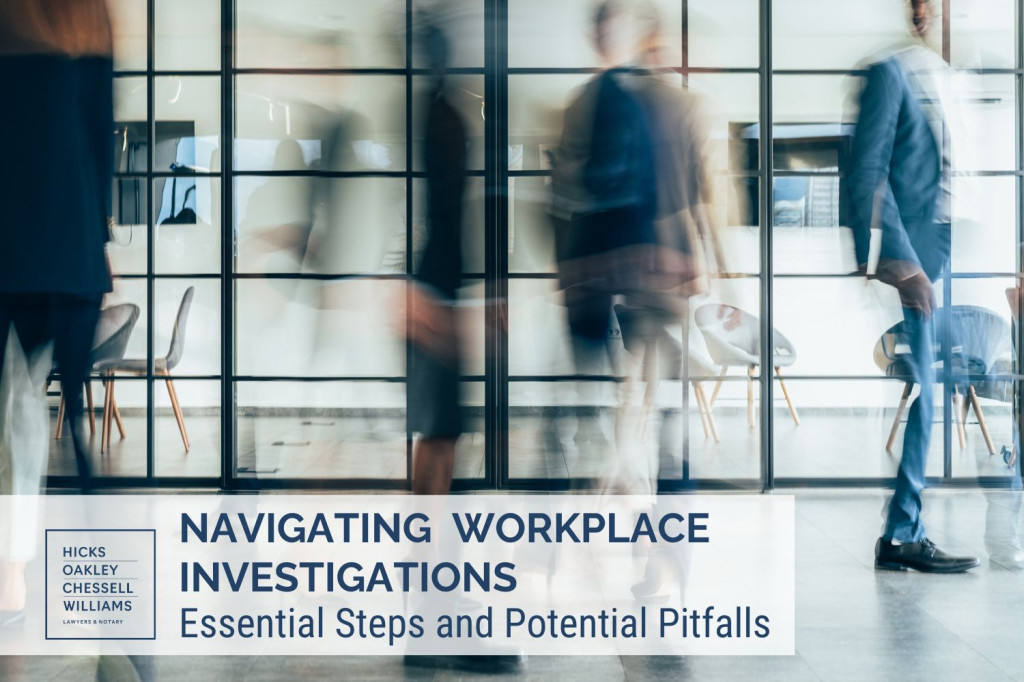Navigating Workplace Investigations: Essential Steps and Potential Pitfalls
What is a workplace investigation and what does an employer aim to achieve from this process?
The foremost concern for employers is understanding the purpose and necessity of conducting such inquiries. Typically, a workplace investigation will aim to address whether there has been any workplace wrongdoing such as performance and conduct issues in the workplace such as bullying and harassment.
The primary aim of the investigation is for the employer to decide based on a thorough process that has produced findings that the wrongdoing did most likely occur and as a result of these findings they as the employer can reach a disciplinary decision.
Further, one of the secondary aims of the investigations is they are necessary for an employer to address the fundamental causes of the concerning behaviour and how to best address workplace culture, OHS concerns as well as policy and procedural developments and improvements.
Do investigations follow a procedure or format?
It is important to note that the requirement to undertake an investigation can in many instances be found in an enterprise agreement or a workplace policy.
The investigation can be undertaken by either a lawyer or a HR professional and it can be either an internal or an external process.
Certain factors may dictate the necessity to seek an external provider, and this can include potential conflict of interests, the risks associated from a legal perspective of the allegations as well as the potential business impact of undertaking the process internally.
Furthermore, certain factors may influence the decision to undertake the process internally and this can include the familiarity of business practices and culture in the workplace.
It is the role of the investigator to establish that the party who must respond to the allegations (the respondent) is provided with clear and precise allegations.
They must also investigate the relevant issues and be impartial. The steps can be listed as follows:
Adhere to procedures and policies that govern how the investigation is to occur.
Direct the parties to adhere to confidentiality.
Identify band interview witnesses and allow all witnesses the option of a support person.
Allow all witnesses breaks and emotional support facilities.
What is the role of the support person?
In short, a support person can be anyone that the respondent chooses, and this can include a lawyer, Union official, friend or colleague. However, the role of a support person is not to be an advocate and they must focus their efforts of emotional and moral support.
What standard of evidence must be applied?
The determination must be based on the Briginshaw test or on the balance of probabilities (Briginshaw v Briginshaw (1938) 60 CLR 336).
It is the role of the investigator to ensure that the evidence relied upon in weighing up the balance of probabilities is of a high probative value, and avoid relying on “inexact proofs, indefinite testimony or indirect evidence” (see Briginshaw decision).
In other words, the investigator must consider, how likely is it that the allegation/s occurred?
Does the investigation take on a particular format?
The short answer is yes.
Prior to the investigation and interviews commencing the respondent must be provided with the following:
Letter of Allegations
Any accompanying evidence
Invitation to a meeting
Once the investigation is completed, the investigator must complete a report for the employer. If done by a lawyer, it must be done under legal professional privilege. The report should note the findings against the allegations, the legal and factual basis for the recommendations as well as other commentary such as witness cooperation.
It is also important that an executive summary be prepared and provided to the respondent or the person who the allegations concern.
Do investigations go wrong?
Once again, the short answer is yes.
One specific example is when and to whom confidential information can be shared.
This issue was considered in the matter of Ariana Goss v Health Generation [2021] FWC 1751.
In July 2020, Ms. Goss, the Director of Client Relations at Health Generation Pty Ltd (Health Generation), raised allegations of sexual harassment, workplace bullying and unpaid entitlements to Health Generation through her lawyer. In response, Health Generation engaged its lawyers to carry out an investigation into these allegations.
Ms. Goss was invited to participate in an interview with the investigator and was advised that she was entitled to bring along a support person of either her lawyer or another individual. Ms. Goss elected to bring her lawyer. Ms. Goss was also directed not to disclose information about the investigation to anyone other than her lawyer.
During the interview, Ms. Goss became aware of comments made by a colleague and witness in the investigation concerning MS Goss’ allegations. Following the interview, Ms. Goss disclosed these comments to her husband. MS Goss’ husband reacted by sending abusive text messages to that colleague which were ultimately reported to Health Generation’s Director of Operations.
Health Generation decided to terminate Ms. Goss’ employment on the basis that she had failed to comply with the direction to maintain the confidentiality of the investigation by disclosing her colleague’s comments to her husband.
The primary question for the FWC was whether Health Generation’s direction to maintain the confidentiality of the investigation was lawful and reasonable.
Despite condemning the text messages sent by MS Goss’ husband, Deputy President Clancy was not satisfied that the direction was reasonable, noting as follows:
“… I consider it is manifestly unreasonable and unrealistic to seek to insist that a person only consult with their lawyers but not a spouse, de facto partner or other individual upon whom they rely for advice and emotional support. Litigious and potentially litigious matters are emotionally draining and require consideration of complex issues…To have expected an individual to operate within the type of solitary vacuum the Respondent [Health Generation] appears to have insisted upon was unreasonable.”
As a result, the Deputy President found that there was no valid reason for Ms. Goss’ dismissal and her dismissal was therefore unfair.
The importance of following procedure is paramount in investigations.
The recent decision from 13 February 2024 of Kildey and Ors v Technical and Further Education Commission [2024] FWC 383 demonstrates the importance of following a process in an investigation and what can occur when this is not followed.
In this decision, which was an unfair dismissal application, three employees Jason Kildey, Norman Browne and Sharon Kerr all worked at TAFE. It was noted that Ms. Kerr and Mr. Browne were de facto partners, and that Mr. Kildey is the nephew of Ms. Kerr.
In February 2021, a complaint was made about Mr. Browne and Mr. Kildey that alleged that the latter was not qualified to teach plumbing and the former was the de facto partner of Mr. Kildey’s aunt, Ms. Kerr and was improperly involved in recruiting and managing him.
Preliminary investigations led to further allegations that Ms. Kerr was also involved in employing Mr. Kildey’s former partner as well as Ms. Browne’s daughter.
In April 2021, TAFE instructed external investigators to conduct the investigation and draft a schedule of allegations. A delay of 5 months ensured from the engagement to when the three respondents were notified of the allegations. The respondents were also suspended on that day.
Importantly, TAFE policies required a risk assessment to be done before suspending the respondents and this was not done. Also, no explanation was provided as to why the respondents could not work.
The respondents were then provided with a redacted copy of the report on 4 October 2022. The respondent’s queried the findings and made enquiries regarding access to additional information.
All three respondents were then dismissed on 13 June 2023.
This matter then came before the FWC and it was noted that all three respondents were unfairly dismissed because the investigation was prolonged, there was a failure to follow the interview process and the parties were not given adequate information.
Also, the FWC was specifically critical of the employer insofar as the show cause letter and process took 9 months from the date the redacted report was provided.
The parties were then reinstated with lost pay.
Both the Goss and the Kildey decision clearly indicate that whilst investigations are necessary, they must be procedurally flawless. If an employer were to attempt to take a short-cut in anyway then it is more than likely that they will not be successful before the FWC in an unfair dismissal application where they have relied on the report to dismiss an employee.
What to consider
Employer must note that investigations must be thorough and impartial and in line with policies and procedures and legislative instruments.
Contact us today to learn how our experienced Employment Law team can help you navigate the complexities of workplace investigations, avoid potential pitfalls, and uphold procedural integrity.


